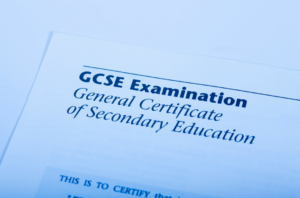What does GCSE stand for?
What does GCSE stand for? The exams taken by 16-year-olds in the UK are officially called ‘General Standard of Secondary Education’ papers, but they’re commonly known as GCSEs.
Usually, students study for and sit 10 GCSEs but may take fewer in addition to diplomas in vocational subjects. They may also take more should they choose to do so.
As students are legally entitled to leave secondary school after they have sat their GCSEs, these exams are some of the most important ones that British people will ever take.

Further Reading: Interested in exam invigilation? Find our more here.
What does GCSE stand for?: The history of GCSEs
The first GCSE papers were introduced in 1988, replacing the existing O Levels and CSEs. Since then, GCSEs have been graded A*-G, with C representing the lowest pass grade.
However, in 2010 reforms to the British National Curriculum by the Conservative government (spearheaded by Education Secretary Michael Gove) introduced a new numerical grading system from 9-1, with 4 representing the lowest pass grade. This grading system was rolled out in 2017.
Other differences include the reduction of coursework, to be replaced by longer exam papers at the end of the course.

What does GCSE stand for?: GCSE subjects
The core subjects that all pupils must study for GCSE include:
- English: both English literature and English language
- Mathematics
- Science: either Combined Science (worth two GCSEs) or 3 of the following (Chemistry, Physics, Biology, Computer Science)
- Languages: one of the following ancient or modern languages
- Ancient languages: Classical Greek, Biblical Hebrew, Latin
- Modern languages: Arabic, Bengali, Chinese (Mandarin), French, German, Greek, Gujarati, Modern Hebrew, Italian, Japanese, Panjabi, Persian, Polish, Portuguese, Russian, Spanish, Turkish, Urdu
- Humanities: history or geography
- Other subjects that can be studied at GCSE in the United Kingdom include:
Sciences and Mathematics:
- Astronomy
- Geology
- Psychology
- Statistics
- Humanities and Social Sciences:
- Ancient History
- Citizenship Studies
- Classical Civilisation
- Religious Studies
- Sociology
- Business and Enterprise:
- Business
- Economics
- Design and Technology:
- Design and Technology
- Electronics
- Engineering
- Food Preparation & Nutrition
- Arts:
- Art and Design
- Dance
- Drama
- Film Studies
- Media Studies
- Music
- Other:
- Physical Education
- What does GCSE stand for?: GCSE examination boards
There are three main GCSE examination boards in the UK. These include:
- Assessment and Qualifications Alliance (AQA)
- Oxford, Cambridge and RSA Examinations (OCR)
- Pearson Edexcel
The examination boards are supervised by:
The Office of Qualifications and Examinations Regulation (Ofqual) in England
Qualifications Wales in Wales
The Council for the Curriculum, Examinations & Assessment (CCEA) in Northern Ireland
What does GCSE stand for?: How do GCSEs relate to higher education?
It is common for secondary schools to use GCSE grades as a predictor of A-Level results and indeed, future qualifications.
It is also usual for pupils to require certain grades – typically Bs but sometimes As – before they are accepted onto A Levels in the same subjects. Schools may also set a minimum requirement, such as Bs or Cs in all GCSE subjects, in order to be accepted into A-Level study.
Although this is not common practice in the UK, some universities – particularly Oxford, Cambridge and other Red Brick institutions of learning – look at GCSE grades in addition to predicted or obtained A-Level grades in order to determine which students to accept.
Students who wish to study degrees related to medicine, dentistry or veterinary sciences may also require specific GCSE grades in order to be accepted for study at university level, especially at the most prestigious universities where course places are highly sought after and only the strongest candidates are accepted.
With Prospero Teaching, you choose how you work. From full-time permanent roles, to day-to-day supply work, we’ll work hard to make sure you have satisfying and secure work when you need it. Register today to get started and access our comprehensive support and training programme with Prospero Learning.
Teaching Blog
No results found.....